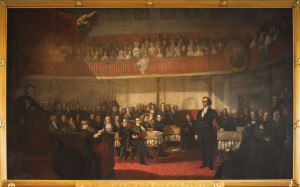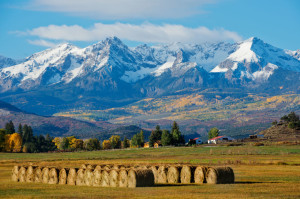A Homily for Independence Day 2019
A sermon preached by Christopher L. Webber, Pastoral Associate, at the Church of the Incarnation, San Francisco, on July 2, 2019.
It never before occurred to me to wonder why we celebrate the 4th of July in Church until this year. This year it happened to be my turn to do the service today and I did the research. I had assumed that of course Americans would celebrate the 4th of July in church – well, at least some church-going Christians would do that – because freedom is a gift of God and our existence as a nation is a gift of God so of course there would be readings and a prayer assigned for the occasion.
But what I learned is: it’s not that obvious. When they sat down to create a Prayer Book for the newly independent Episcopal Church – no longer a part of the church of England but an independent church within the Anglican Communion – they included a form of service to celebrate what they called: “the inestimable blessings of Religious and Civil Liberty to be observed by this church for ever.” Of course. Obvious. Who would question?
Well, one who questioned was William White, the first bishop of Pennsylvania, who pointed out that the great majority of American clergy had not supported the Revolution – indeed had opposed it – and many had fled to Canada rather than work or pray for independence. Those who remained, White pointed out, were not likely to use such a service, celebrating what they had opposed, and would be greatly embarrassed if they did. White himself had supported independence, had served as a chaplain to the Congress, but he was concerned for his colleagues who had seen things differently. The war was over, White thought; let’s not embarrass each other. So the General Convention took the form out of the Prayer Book and it was only added in 1928 when the one-time loyalists had presumably all gone to their reward.
So it’s been there all my life time – and probably yours unless you’re over 91 – but we shouldn’t take it for granted. It took a while, but here we are, and here we ought to be because freedom is a gift of God and we have great cause to be thankful.
But look what they gave us when they finally got up their nerve: not just an appropriate form of thanksgiving for events well over 200 years ago but words to challenge us as if they had been especially chosen for current events, words to remind us of what it means to be a nation blessed with great gifts. The gift of freedom is a gift of God and it comes with an obligation. Listen again to the words we read this morning from the Old Testament:
“The Lord your God …. executes justice for the orphan and the widow, and . . . loves the strangers, providing them food and clothing. You shall also love the stranger, for you were strangers in the land of Egypt.”
If that’s not clear enough, I would refer you to the newest translation I know of, the Common English Bible, published under ecumenical auspices less than ten years ago, which puts it this way:
“He enacts justice for orphans and widows, and he loves immigrants giving them food and clothing. That means you also must love immigrants, for you were immigrants in the land of Egypt.”
Yes. “You must love immigrants.” “You yourselves were immigrants.” What part of that is not clear?
Now those words, of course, were written to Jewish people living in Canaan centuries after their ancestors had escaped from Egypt. I would guess most of us – most of our families – have not been around that many centuries. Three of my grandparents were immigrants. I know how my parents grew up as first generation Americans, first of their families to go to college and, in my father’s case, only after dropping out of school to help support the family and being enabled to go back to finish high school and college and seminary by a wealthy neighbor who took an interest and an older sister who had dropped out of school after 8th Grade to help support the family. This is a country where such things are possible. No wonder it continues to draw others.
No wonder also that we have an obligation to share the gifts we’ve been given. “. . . he loves immigrants giving them food and clothing. That means you also must love immigrants . . .”
But what instead do we see? You’ve seen the pictures. I don’t need to tell you.
I was delighted in watching the debates last week to hear the one Episcopalian in the debate say this: “We are committed to the separation of church and state and we stand for people of any religion and people of no religion. But we should call out hypocrisy when we see it in a party that associates itself with Christianity to say that it is okay to suggest that God would smile on the division of families at the hands of federal agents, [to say] that God would condone putting children in cages has lost all claim to ever use religious language again.”
Yes. Absolutely. The Bible lays a claim on our lives, lays a claim on our actions. We  as Americans, as American Christians, are under obligation, under orders and we will sing about it before we leave:
as Americans, as American Christians, are under obligation, under orders and we will sing about it before we leave:
“O beautiful for patriot dream that sees beyond the years
thine alabaster cities gleam undimmed by human tears . . .”
But must it be indeed always “beyond the years”?
Why not in our own day?
Why not now?
 Christopher L. Webber
Christopher L. Webber